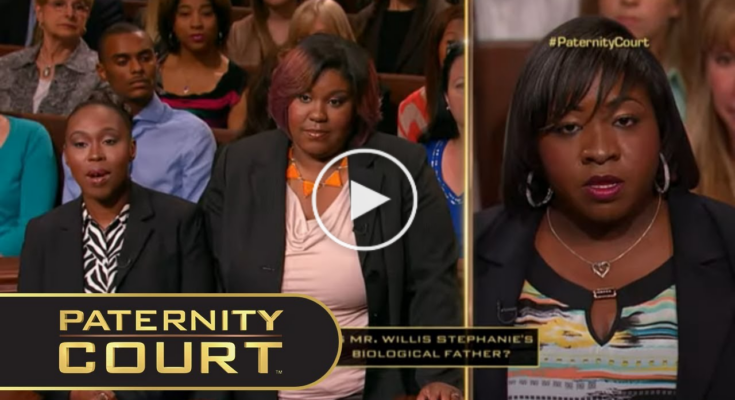Paternity disputes have long been a challenging and emotionally charged area of family law. The court case Love/Willis v. Williams and Williams presents a compelling example of the complexities surrounding such disputes. The quest for truth and closure takes center stage as Stephanie Williams claims to be the daughter of the late Andre Willis, leading to a series of conflicting testimonies and the use of DNA testing. This article delves into the intricacies of the case, exploring the emotional turmoil experienced by all parties involved.
Stephanie Williams firmly believes she shares a striking resemblance with Deandrea Love and Tameka Willis, daughters of Andre Willis. She shares instances where people have approached her, commenting on the supposed family resemblance. “Throughout my whole life, people approach me and ask me, ‘Do you have a sister that lives in Beecher?'” Stephanie reveals, showcasing her conviction in the matter.
However, Deandrea and Tameka remain skeptical about the claimed resemblance. “No,” Deandrea firmly denies the resemblance, hinting at the lingering doubts that have plagued the family for years. Such doubts stem from a past marked by their father’s infidelity and indiscretions.
Andre Banks, another sibling of Deandrea and Tameka, corroborates the possibility of Stephanie being their half-sister. He candidly admits, “We’re talking about my dad. He was a Rolling Stone. There’s a possibility.” His acknowledgment sheds light on their father’s promiscuous history and adds depth to the paternity dispute.
Deandrea and Tameka present a contrasting view, stating that their father acknowledged all of his children, regardless of the different mothers involved. They wonder why their father never recognized Stephanie as one of his children. “If he truly believed Ms. Williams was his daughter, too, why wouldn’t she be included?” Tameka questions, seeking to understand the puzzling situation.
Stephanie’s desire for closure is palpable throughout the proceedings. Regardless of the DNA test results, she seeks the truth about her paternity, recognizing that it forms an integral part of her identity and family history. “Whether it is or it isn’t, I’m here today to get closure,” Stephanie affirms, determined to find clarity in her familial ties.
The moment of truth arrives as the court reveals the DNA test results obtained from Andre Willis’s blood sample. The test conclusively determines that Andre Willis is not Stephanie’s biological father. The revelation is met with shock and disappointment, highlighting the emotional turmoil involved in such cases.
Despite the outcome, the court urges Deandrea and Tameka to display compassion toward Stephanie. It emphasizes that Stephanie had been operating based on what she had been told, seeking her truth in good faith. “Stephanie had been trying to find her place in our family. I can’t help but feel for her,” Tameka states, acknowledging the complex emotions surrounding the situation.
As the case unfolds, the conflicting perspectives among the siblings and their mother create tension. The court’s call for compassion serves as a crucial reminder of the significance of empathy and understanding in such sensitive family matters. “Regardless of the results, we need to find a way to heal and come together as a family,” Deandrea emphasizes, recognizing the potential for growth amidst disappointment.
Following the DNA test results, emotions run high, and the family faces the challenge of processing the outcome. Stephanie, still grappling with the truth, reflects on the situation, “Whether he was my father or not, I will always cherish the love and connection I felt with this family.” Her sentiment highlights the complexity of familial bonds and the significance of shared experiences.
Love/Willis v. Williams and Williams provides a poignant illustration of the complexities and emotions inherent in paternity disputes. As the quest for truth and closure unfolds, the case sheds light on the significance of DNA testing in resolving such uncertainties. Amidst the disappointment and differing perspectives, the court’s call for compassion becomes a crucial reminder that familial bonds extend beyond biology.
Paternity disputes, although challenging, can offer an opportunity for healing, understanding, and growth for all parties involved. As the family navigates the aftermath of the court’s decision, it is hoped that they find a path to reconciliation and emotional peace. “Despite the outcome, we are still a family, and we must learn to understand and accept each other,” Stephanie reflects, seeking to bridge the divide between her and her purported siblings.
In the face of paternity doubts and the quest for truth, Love/Willis v. Williams and Williams showcases the complexity of familial relationships and the impact of unresolved uncertainties. The emotional journey undertaken by Stephanie and her alleged siblings provides a profound lesson in compassion, understanding, and the importance of healing in such delicate situations.
While the DNA test results may not have provided the outcome Stephanie sought, the case’s legacy lies in its call for empathy and acceptance. As families navigate paternity disputes, it is essential to remember that love and connection can transcend biological ties. In the pursuit of truth and closure, embracing the complexities of family dynamics may pave the way for healing and unity, offering a path to emotional reconciliation for all parties involved.



